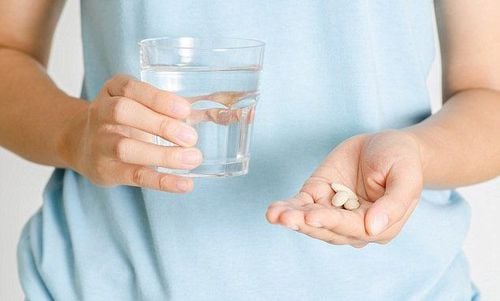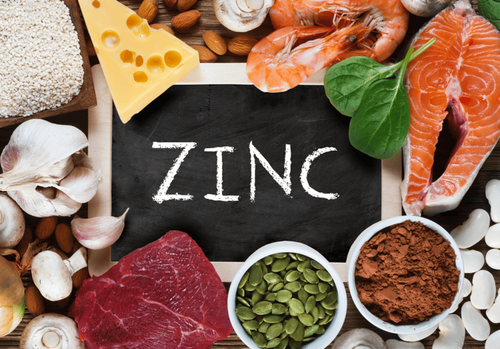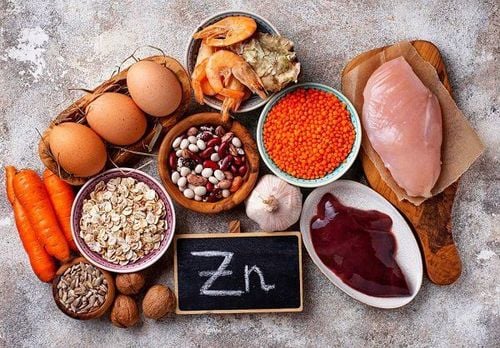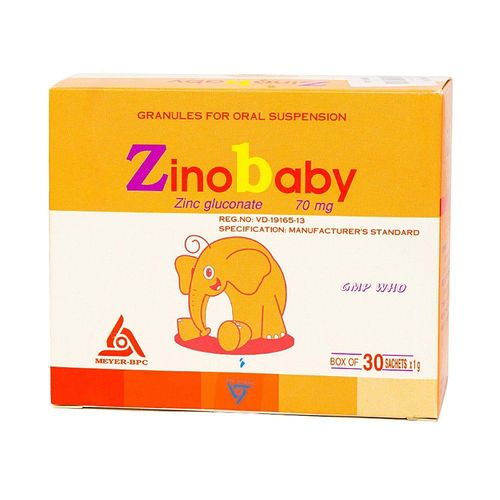This is an automatically translated article.
As an essential trace element, zinc is of primary importance in many biological processes, acting as an antioxidant and strengthening the immune system. Zinc Gluconate or zinc gluconate is a nutritional supplement containing the zinc salt form of gluconic acid indicated for the purpose of providing zinc.
1. What is zinc gluconate?
Zinc is a mineral in nature. In the body, this is called an "essential trace element" because a very small amount of zinc already has an essential role for human health. Since the human body cannot store excess zinc, this element needs to be consumed regularly as part of the daily diet. Common natural food sources of zinc include red meat, poultry, and fish. Zinc deficiency can result in short stature in young children, reduced ability to taste and smell, and limited activity in the testicles and ovaries.
In medicine, zinc is taken orally to treat and prevent zinc deficiency and its consequences, including growth retardation, acute diarrhea in children, prolonged wound healing, and Wilson's disease.
Besides, elemental zinc, in the form of zinc gluconate salt is also used to strengthen the immune system, improve growth and health in zinc-deficient infants and children, to treat common colds. common and recurrent ear infections, influenza, upper respiratory tract infections, prevention and treatment of lower respiratory tract infections as well as used for malaria and other diseases caused by parasites.
Some patients are also prescribed zinc supplements for an eye disease called macular degeneration, night blindness and cataracts. On the other hand, the role of zinc has also been demonstrated in asthma, diabetes and diabetes-related nerve damage; High Blood Pressure; HIV/AIDS or pregnancy complications, HIV-associated diarrhea and AIDS-related malabsorption syndromes, AIDS-related infections, and hyperbilirubinemia.
In addition, zinc gluconate is also involved in the treatment of anorexia nervosa, obsessive-compulsive disorder, depression, memory loss, dry mouth, attention deficit hyperactivity disorder, hepatic encephalopathy, liver related diseases to alcohol, ulcerative colitis, inflammatory bowel disease, mouth ulcers, stomach ulcers, leg ulcers, and pressure ulcers.

Thuốc zinc gluconate có thể được sử dụng trong điều trị tâm thần, trầm cảm
2. What are the uses of zinc gluconate?
2.1 Main uses Zinc gluconate is an effective treatment for zinc deficiency. Zinc deficiency can occur in people with severe diarrhea, a condition that makes it difficult for the intestines to absorb food, cirrhosis of the liver, and alcoholism. This condition can also occur after major surgery and during prolonged use of tube feeding in the hospital.
Indications to use zinc orally or give zinc intravenously will help quickly restore zinc levels in people with zinc deficiency. However, regular zinc supplementation is not recommended.
2.2 Additional Uses Diarrhea : Taking zinc gluconate tablets by mouth has been shown to reduce the duration and severity of diarrhea in undernourished or zinc-deficient children. Severe zinc deficiency in children is a common condition in developing countries. Simultaneously, clinicians need to provide zinc to undernourished women during pregnancy and continue until one month postpartum to reduce the incidence of neonatal diarrhea within the first year of life.
Wilson's disease: Taking zinc daily improves symptoms of a genetic disorder known as Wilson's disease. People with Wilson's disease often have too much copper in their bodies. At this time, the element zinc will prevent copper from being absorbed and increase the amount of copper released by the body.
Skin acne: Studies show that people with acne have lower blood and skin zinc levels than the general population. Thus, taking zinc supplements will help treat acne. However, it is still unclear how beneficial zinc is compared to acne medications such as tetracycline or minocycline. Therefore, topical application of zinc in ointments does not appear to help treat acne unless used in combination with the antibiotic erythromycin.
Age-related vision loss: It is macular degeneration in the elderly. Observational studies show that people who consume more zinc as part of their diet have a reduced risk of age-related vision loss. Therefore, supplementation with zinc and antioxidant vitamins may mitigate and prevent age-related vision loss in high-risk individuals.
Anorexia: Taking zinc supplements by mouth may help with weight gain and improve symptoms of depression in adolescents and adults with anorexia.

Người bệnh chán ăn có thể bổ sung viên zinc gluconate bằng đường uống
Attention Deficit Hyperactivity Disorder: Oral administration of zinc tablets in combination with conventional treatment may slightly improve hyperactivity, impulsivity, and socialization problems in some children with psychotic disorders. this god. The basis of this treatment is based on several studies that show that pediatric patients often have lower blood zinc levels than children without the disease.
Skin burns: Intravenous administration of zinc along with other minerals seems to improve wound healing in people with burns. However, taking zinc alone does not seem to improve wound healing in all people with burns, but it may decrease recovery time in people with severe burns.
Rectal and colon tumors: Research shows that taking a vitamin supplement containing selenium, zinc, vitamin A 2, vitamin C and vitamin E by mouth daily for 5 years reduces the risk of bowel tumor recurrence. about 40% large.
Common cold: Although some conflicting results persist, most research shows that taking lozenges containing zinc gluconate or zinc acetate by mouth reduces the duration of colds in adults. However, side effects such as bad taste in the mouth and nausea may limit its usefulness.
Diabetic foot ulcers: Research shows that applying a gel containing zinc hyaluronate can help foot ulcers heal faster than conventional treatment in people with diabetes.
Diaper rash: Giving zinc gluconate by mouth to infants speeds up the healing of diaper rash. Besides, applying zinc oxide paste on the skin also improves the healing of diaper rash.
3. What is the dose of zinc gluconate?
The usual adult dose of zinc gluconate to supplement with natural diet is from 105mg to 350mg.The requirements for dose adjustment according to renal function and liver function have so far been unsubstantiated. In case of overdose, dialysis techniques have not been demonstrated for the active agent zinc.
Pediatric use of zinc gluconate with safety and efficacy has not been established in pediatric patients under 12 years of age.
Although absorption may be slightly affected when taken by mouth on a full stomach, patients should still be advised to take zinc gluconate with food to avoid gastric upset. medicine.
In addition, information about the use of drugs, the dosage to be taken and the duration of use in specific conditions requires consultation with a specialist.

Người bệnh không nên tự ý dùng thuốc, cần phải sử dụng theo đúng phác đồ của bác sĩ
4. What are the side effects of taking zinc gluconate?
Although using the active ingredient zinc gluconate in different dosage forms, including mixed powder, oral lozenges, oral tablets, and dispersible tablets, the drug may still have side effects that should be noted as follows:
On the endocrine system Endocrine side effects include a decrease in high-density lipoprotein (HDL-C) in men. Because zinc supplements have the ability to reduce low-molecular-weight lipoprotein (LDL-C), the ratio of LDL-C/HDL-C remains unchanged, so patients do not have an increased risk of cardiovascular diseases. due to atherosclerosis.
On the digestive system Gastrointestinal side effects include bad taste in the mouth (80%), nausea (20%), mouth irritation (24%), dry mouth (12%), confusion gastrointestinal tract (10%), taste distortion, abdominal pain, vomiting, and diarrhea.
Gastrointestinal irritations such as those from zinc supplements appear to be dose related.
On the nervous system Nervous system side effects are rare and if encountered include dizziness and headache. Therefore, when using zinc gluconate, patients need to be informed of symptoms about possible side effects. Therefore, get emergency medical help if you have any signs of an allergic reaction, including hives, difficulty breathing, swelling of your face, lips, tongue, or throat. Less serious side effects such as nausea or stomach upset may improve with discontinuation of the drug.
In summary, zinc is an essential mineral in many aspects of health and disease treatment. However, the daily zinc supplement should be strictly according to the doctor's prescription in each specific case. On top of that, many foods that are rich in this mineral, such as nuts, beans, meat, seafood and dairy, still need to be encouraged to increase their daily intake.

Người bệnh nên tăng cường sử dụng các loại thực phẩm chứa kẽm trong bữa ăn hàng ngày
Vinmec International General Hospital with a system of modern facilities, medical equipment and a team of experts and doctors with many years of experience in medical examination and treatment, patients can rest assured to visit examination and treatment at the Hospital.
Please dial HOTLINE for more information or register for an appointment HERE. Download MyVinmec app to make appointments faster and to manage your bookings easily.
MORE
Zinc deficiency causes what disease? When to take a zinc supplement? The role of zinc - Guidelines for reasonable zinc supplementation Zinc deficiency: Signs and diagnosis













